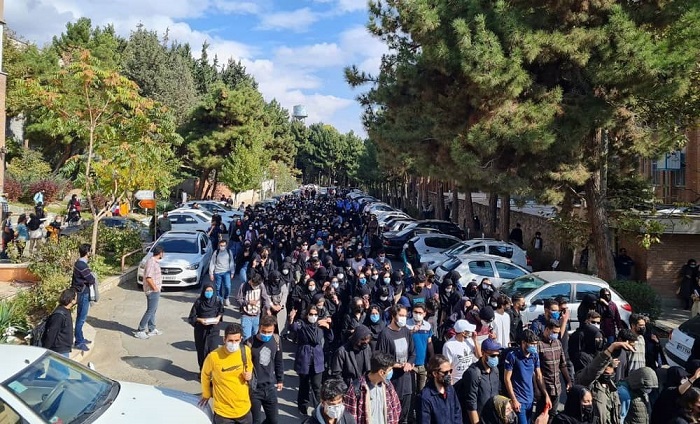

The powerful influence of universities and students, evident in the prior uprisings where they illuminated paths away from the regime’s misleading tactics, has placed them in the regime’s crosshairs.
A confidential document disseminated in Iran’s universities revealed the Ebrahim Raisi administration’s aggressive recruitment of 15,000 Basij members and regime proponents as academic faculty members. This recruitment bypasses existing academic norms, stressing urgency and quotas.
Although the government has attempted to dismiss these claims, evidence from the Telegram channel “GhyamSarnegouni” unveiled a resolution by the National Security Council from last December, directing the appointment of faculty aligned with the Islamic Revolution’s principles.
"Down with the Oppressor, Be it the SHAH or The SUPREME LEADER": A popular slogan chanted by protesters in universities across Iran. WATCH pic.twitter.com/knAwYP6Z12 #IranProtests #مهسا_امینی #مرگ_بر_ستمگر_چه_شاه_باشه_چه_رهبر
— Ali Safavi (@amsafavi) December 11, 2022
Reports indicate that the regime is also targeting dissenting students and professors. From December 2022 to February 2023, over ten sessions led by the head of the Islamic Revolutionary Guard Corps (IRGC) strategized against those opposing the establishment. The fallout: 2,800 students summoned, 643 students expelled, and 281 individuals suspended. Moreover, 22 students from Mazandaran face travel bans.
The regime’s clear strategy is to remove academic luminaries and replace them with those aligned to its principles. News of widespread ousting, especially within the humanities, has even reached government-run media. Still, the exact number of those affected remains uncertain due to the climate of fear.
The same slogan was chanted by #IranProtesters in various locations, on the peek of the #Protests on Tuesday the 14, 2020: "We do not want neither the Shah or the leader (Khamenei). We do not want the bad or the worse"#IranProtests #FreeIran2020 pic.twitter.com/GdoBmqOoQP
— NCRI-FAC (@iran_policy) January 16, 2020
Reflecting on historical disdain for academics, the regime’s founder Ruhollah Khomeini once said, “The world has been corrupted by universities.” This sentiment is still evident today. An article from a state-related newspaper published on August 20 questioned the regime’s hostility towards universities and pinpointed opposition to genuine knowledge as the root cause.
But to solely attribute this to the ideological rift between the clerics and academia underestimates the situation. Both the 1980 Cultural Revolution that saw a two-year university shutdown and the recent attacks labeled the “Second Cultural Coup,” stem from the regime’s apprehension of universities as freedom fortresses.
The University of Tehran (Meli Univ)-#IranProtesters chant: "Death to the tyrants, be it the shah or the leader"#FreeIran2020 #IranProtests pic.twitter.com/vRGTOE3Sxr
— NCRI-FAC (@iran_policy) January 16, 2020
Despite these suppressive tactics, as demonstrated by the 2022 uprising, universities remain robust symbols of liberty and resistance against oppression. Emphasizing unity between religious and academic spheres, it is evident that the latter continues to champion its esteemed status as a “Bastion of Freedom.”

MEK Iran (follow us on Twitter and Facebook), Maryam Rajavi’s on her site, Twitter & Facebook, NCRI (Twitter & Facebook), and People’s Mojahedin Organization of Iran – MEK IRAN – YouTu







